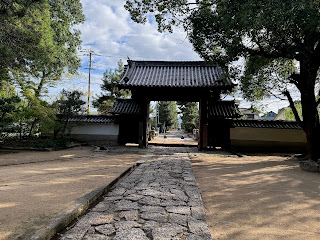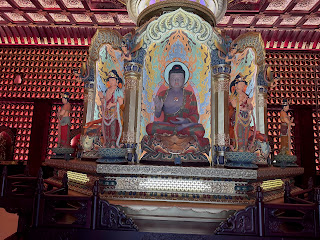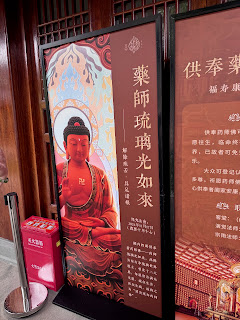A relative recently indirectly criticized my stance on undocumented migrants and sanctuary cities by writing "there are some people on here who have the misguided belief that violent criminals are also victims of society because 'circumstances' had driven that person to be violent..."
Well, from my Buddhist perspective that's incorrect and a straw-man to boot.
From a Buddhist perspective existent things come about as an interplay of the five skandhas, or aggregates: form, feeling, thought, volition, and consciousness. The interplay plays out according to karma, or, if you will the interdependency of all aggregates. People experience this interplay through their experiences, but indeed, their experiences are the result of karma, but their "small self," acting/experienced as thought and volition isn't a bit player here, but rather an active, if unaware participant in these aggregates.
Whilst in Zen we strive to practice mindfulness to transcend greed, anger, and delusion, that "small self" isn't unnecessary, despite its dependency of the interplay of the five aggregates; it serves a survival purpose, for example. But just as whales have learned to breach the water's surface from other whales, every verbal thought in our heads is the result of others, as well as the small self's thought, volition, and consciousness.
So it is false to say that one who holds the Great Vehicle view as approximated by the above says "society" is "to blame" for violent criminals behavior. (An interesting data point regarding karma, and whether "society" is blameless or not is the story of Charles Whitman and his brain tumor.)
All of the above having been said, another point I made in that exchange is that fundamentally, one is no different than an undocumented migrant. I did not specifically address the question of violent undocumented migrants, but the fact is, it is still the case that "law abiding" citizens are indeed fundamentally no different than violent criminals, because whether law abiding or not they are all due mercy and compassion because of their very existence as beings.
My nephew further went on to say "99.99% of people with similar upbringings [are] non-violent people."
William Barrett's Irrational Man: A Study in Existential Philosophy has an apt passage as a rejoinder:
The first novel Dostoevski wrote after his return from imprisonment in Siberia was Memoirs from the House of the Dead. Since the book came after the decisive events of his life—his near execution by a firing squad and his penal servitude in Siberia—it can be taken as the beginning of the real Dostoevski. The narrative that comprises the second part of the book, which is the novel proper, is fairly negligi ble; but the first part, the description of prison life in Siberia, is of crucial importance in understanding Dostoevski's deepest insights into human nature. An experience like his in this Siberian prison lay outside the whole humanistic tradition of European culture and could only be expected to yield knowledge of man that that tradition had not yet come upon. No classicist or rationalist, armed with the Aristotelian definition of man as the rational animal, could have been exposed to such a welter of humanity and still have retained his ancient convictions. What Dostoevski saw in the criminals he lived with is what he came finally to see at the center of mans nature; contradiction, ambivalence, irrationality. There was a childishness and innocence about these criminals, along with a brutality and cruelty, altogether not unlike the murderous innocence of a child. The men he knew could not be categorized as a criminal type and thus isolated from the rest of the species, man; these criminals were not “types,” but thoroughly individual beings; violent, energetic, intensely living shoots from the parent stalk. In them Dostoevski was face to face with the demoniacal in human nature; perhaps man is not the rational but the demoniacal animal. A rationalist who loses sight of the demoniacal cannot understand human beings; he cannot even read our current tabloids.
From a Buddhist perspective, "demoniacal" can be substituted with "subject to greed, anger and delusion."
So there's fundamentally no difference, regardless of the percentage of violent criminals.




























